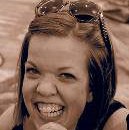- A
- A
- A

Picture This
I was recently sitting with a group of disabled people in a crowded mall. We were all squeezed tightly around a food-court table discussing a current disability policy issue. At the table were two little people, a person with spina bifida and two quads- a decent distribution of diversity, if you ask me. As an outsider, one might wonder what we were up to, as we had laptops and papers spread across the table and we were, very clearly, discussing important issues. One might even wonder why we were doing such work at a food-court in a mall. We asked ourselves this, too.
However, in the middle of this discussion, a woman and her two kids walked up and proceeded to take a picture. As a little person who has experienced this before, I knew exactly what was happening. Person takes our picture to then post on some form of social media to exclaim to all of her friends what she saw that day. As my blood began to boil, I looked up and realized that the only two people that had any clue of what was happening were the two little people. I asked the other people with disabilities if they saw. They responded with, “Saw what?” This isn’t to say that the others were clueless in any way, as they are some of the most intelligent people I know, but it was, very clearly, not something they had ever dealt with as part of their experience with disability.
The following Tuesday, my partner and I were headed to dinner. Dinner on a Tuesday night with nothing exciting happening, and I must admit, I was not even wearing anything that was that remarkably fashionable. It was just a Tuesday. As we were headed to dinner, a fellow citizen of Philadelphia took our picture with his phone. We knew because his phone’s flash went off as he pointed it straight at us.
Two days later, as we were out for our nightly walk with our dogs, I just happened to glance up as someone was standing on their balcony with their camera phone pointed straight at us. He jumped as I glanced up and his flash went off.
As a little person, this happens ALL the time. I am positive that there are millions of photos of me out there on some social media site with the #midget next to it. (If you know anything about LP politics, then you’ll know we don’t use that word. If not, then now you do. The m-word, as we like to call it, is similar to the r-word. We just don’t say it, much less hashtag it.)
Thus far, I haven’t really been interested in using this blog as a platform to discuss my personal experiences with disability, but have, instead, enjoyed analyzing different aspects of disability policy and social oppression. However, THIS, this is an experience that needs to be illuminated. From my limited knowledge, while little people are not the only ones that experience such sidewalk objectification, it definitely is not a universal experience for all disabled people.
The problem with having your picture taken without your consent is ten fold.
First, it’s objectifying. While I could write an entire blog about this topic, objectification, in a nutshell, is when you treat a person like an object rather than a person.
Further, for the one that is objectified, there is no good response or strategy for dealing with this. One can either choose to ignore it or choose to fight it. Ignoring it may be better for their short- term mental health, but it leaves them to internalize the objectification with no true outlet for expressing their own views on their body. Moreover, it will only cause them to wonder where their picture will be posted for others to comment. However, if they choose to call the person out for taking the picture, this can, at times, be very risky. This option must be carefully and quickly weighed, as you only have a second to respond. If one does choose to go this route, they must make a quick statement to the photographer regarding the facts. They must know for sure, without a doubt, that a picture was taken. They must then proceed with absolute certainty and hope that the person is willing to admit that they even took the picture and is willing to delete it. As you can see this takes A LOT of energy. Energy that can be better utilized other places. Who wants to put out a full argumentative approach every time someone pulls out a camera phone?
Needless to say, this practice is not ok. If you are reading this and regularly take pictures of other people with your cell phone, I encourage you to research objectification and take a look in the mirror to see how you are part of the problem.
There has been some recent discussion within the disability community as to why reality shows are not representing the full diversity of the disability community by only showing the lives of little people. While I agree and am all for showing the full breadth of the disability experience and not just the LP experience, I also wonder if reality shows are not just picking up on this societal trend of objectification and profiting on the opportunity to allow spectators to look without even having to take a picture?
Leah Smith is a writer, communications professional and disability advocate. Leah holds a Bachelor’s in Public Relations and a Masters in Public Administration and Policy. She has focused her career on creating access and equality for all. Leah currently resides in Philadelphia with her partner and two dogs.